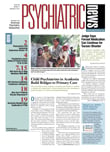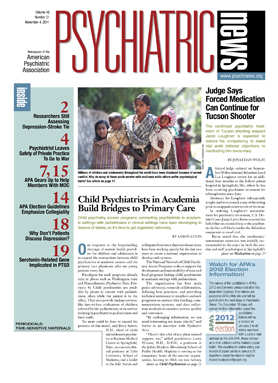Pedro Ruiz, M.D., a past president of APA, was installed as president of the World Psychiatric Association (WPA) in September at the WPA's meeting in Buenos Aires.
Ruiz was elected president-elect in 2008 and will serve a three-year term as president. In that role, he will lead the international organization that comprises 135 psychiatric societies representing 120 countries; he also chairs the WPA Executive Committee, which consists of six secretaries who serve as officers of the association and meet every three months.
Three other APA members were also elected to office at the Buenos Aires meeting. Former APA President John McIntyre, M.D., was elected as the zonal representative from the United States; Donna Stewart, M.D., was elected zonal representative from Canada; and Michelle Riba, M.D., also a past APA president, was elected secretary of publications and will serve on the Executive Committee (see
From APA to the World Stage).
The WPA is the international voice of psychiatry. In the 1980s it was instrumental in protesting the use of psychiatry to stigmatize and detain political dissidents in the former Soviet Union. More recently, the WPA helped mobilize an international psychiatric response to the earthquake and tsunami in Japan.
In an interview with Psychiatric News, Ruiz said that chief among his priorities will be establishing liaisons between WPA, APA, and developing countries. In his previous WPA role as secretary of meetings, Ruiz said he helped organize psychiatric conferences in Romania, Pakistan, Kenya, Cuba, Sri Lanka, and other areas where there has been minimal psychiatric presence.
"I will be visiting Paraguay, Uganda, and Bali and am developing a plan of action for bringing educational seminars to programs for young psychiatrists and primary care physicians," Ruiz said.
Another priority for Ruiz—and an issue of special significance to American psychiatrists—will be helping to ensure that DSM-5 and the ICD-11, which is produced by the World Health Organization, continue to be generally concordant. "It will not be a good thing for the DSM-5 to be too different from the ICD, and we in the WPA will be working to ensure harmonization," Ruiz said.
Ruiz said that increasing globalization, as well as the enormous diversity of membership within APA—representing a significant number of psychiatrists born and trained outside of the United States—makes the WPA vitally important to American psychiatry. "APA is among the most important members [of the world organization], and I will work to ensure that the voice of American psychiatry is heard within the WPA," he said.


